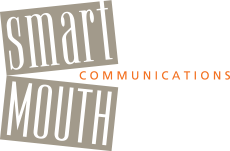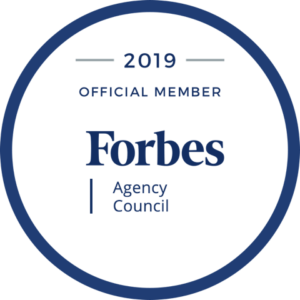by Beth Levine | Apr 2, 2014 | preparing for a presentation, public speaking
Looking for your message or big idea? Here’s an easy shortcut that works 99.9% of the time:
Go to the end of the document or page of notes you’ve written to prepare for your talk, and it’s probably sitting right there in the last paragraph or last sentence. We tend to save our best thoughts for the end, and so our conclusion usually nails it.
Go ahead and take that thought or statement and move it up front, it’s your message! (For more on how to construct a talk or presentation, and where to put your messages, refer to your SmartMouth Public Speaking Toolkit.)
by Beth Levine | Mar 19, 2014 | public speaking, quote
“If you can’t write your message in a sentence, you can’t say it in an hour.”
Dianna Booher, Communications Consultant
There may be a few different ways to interpret Booher’s quote, but to me it says … do the heavy lifting so your audience doesn’t have to!
In other words, when you sit down to prepare for a talk or presentation, take a few moments to do some critical thinking about what you want your messages – or your main points – to be. If you don’t, you could end up talking and talking, as Booher suggests, and never getting anywhere.
The heavy lifting is simply a matter of preparing and packaging ahead of time. To find your message, ask yourself what your capture or summary points are. What are the statements that capture and convey the importance, significance or value of what you’re talking about? They should be one sentence each.
By writing your message in a sentence, you will be more efficient with time – yours and your audience’s – and you will have a much better chance of getting your point across to your audience.
by Beth Levine | Mar 6, 2014 | smartmouth talks!
Talk to or with your audience, not at them. Make it a two-way street. Ask questions, invite interruptions, solicit pertinent stories and anecdotes. Make your audience part of your presentation rather than relegating them to spectator. Size of the audience shouldn’t matter, you can still reach out and they can still respond.
by Beth Levine | Feb 20, 2014 | Just Mouthing Off
President’s Day is more than a day off from work or school. It’s when we remember the February birthdays of two of our early Presidents, both of whom were known for their honesty.
If honesty was part of what earned George and Abe their places in history, then we should probably take a page from their playbook for our own communications, right? But how do we do that? What would it mean to be “honest” in our communications beyond the obvious of telling the truth?
Here are 3 types of honesty you can apply to your communications – speeches, presentations, interviews with the media, or ordinary business conversations – that I bet would be endorsed by George and Abe:
- Transparency. Audiences are very discerning and can smell a phony within seconds. Be real; let people see you, let people see what’s happening. If you have good news, call it good news. If you have bad news, call it out as bad news. Spin (a self-interested selection of the facts) only goes so far. Be as open and forthright as possible.
- Self-Awareness. Is there an elephant in the room? Your situation might require an apology or an admission of wrong-doing before you can get an audience’s attention, let alone win its trust. Or perhaps you’ve being criticized and need to respond. In that case, you’ll want to be prepared to own the “criticisms” that also happen to be true. Very often, criticism is true and with good reason. Don’t automatically get hot under the collar when attacked. Reflect on yourself and then own it with confidence if it’s you and it’s true.
- Fairness. Intellectual honesty is a credibility win-win. If you have an opponent or a competitor, and you can be objective and fair about what you share in common as well as what differentiates you, then you will score big points with your audiences. Likewise, being willing and able to call out your friends and also applaud your enemies is a credibility-winner and reputation-booster.
These 3 tips are more nuanced versions of honesty than confessing to chopping down a cherry tree or walking miles at night to return pennies to a customer who overpaid, but they’re just as appealing. Give them a whirl!
by Beth Levine | Feb 5, 2014 | smartmouth talks!
“No one ever complains about a speech being too short!” – Ira Hayes
There are lots of quotes that convey the same sentiment – e.g. “always leave them wanting more” – and for good reason. You can never really be too brief, but you surely can be too long-winded.
So the tip of the month is to err on the side of brevity. Even the best speakers can lose their audiences when they overstay their welcome.
You’ll never be criticized for being brief; you’ll probably be thanked for allowing the audience time to ask for the detail they’re interested in hearing!
It is, after all, all about them!



